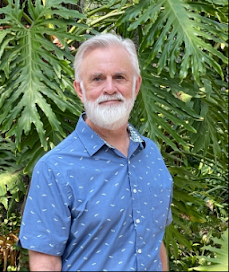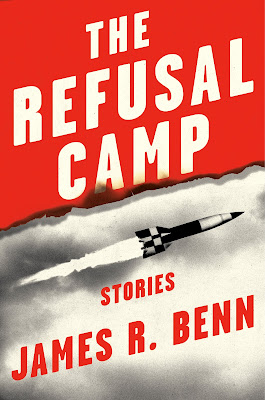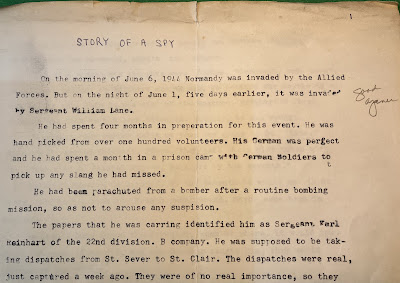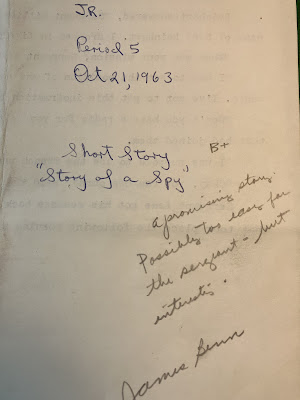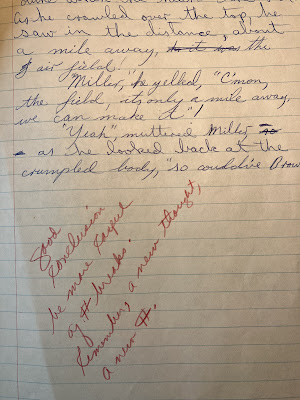LUCY BURDETTE: We’re always delighted to welcome our friend and wonderful writer James (Jim) Benn back to the blog with a new book. This time he’s come with an unusual problem…take it away Jim!
JAMES BENN: There are many challenges when writing a mystery. Authors wrestle with clues, red herrings, and historical details.
But I have a different problem.
People. Real historical characters who step onto the stage and threaten to take over the whole show. It’s hard enough stage-managing my own cast of fictional characters, but I often introduce a historical personage when there’s a good match for the narrative in terms of time and place.
In my Billy Boyle WWII mystery novels, fictional series regulars encounter real characters in every book.
Only two of them have been troublesome. Both were actors.
In my seventh novel, Death’s Door (2012), I needed a way to smuggle Billy Boyle and his partner Piotr “Kaz” Kazimeirz behind enemy lines in Italy. My research brought me to actor Sterling Hayden who served as an OSS agent in Italy during WWII, smuggling arms across the Adriatic to the Yugoslavian Partisans.
Hayden used a fishing boat to evade German patrols, so he was enlisted to ferry Billy and Kaz to their rendezvous. Sterling Hayden almost stole the show. His true persona was bigger than life and he leapt off the page. He simply refused to exit stage right when first ordered to do so. It was only when I promised to bring him back for the conclusion of the story that he gracefully faded from the narrative. Hayden was a real-life adventurer, his movie career probably the least important thing in his life, as evidenced by the fact that he enlisted under the pseudonym John Hamilton.
It didn’t happen again until I was researching the nineteenth title in the series, The Phantom Patrol (release date 9/3/24). I discovered that David Niven served during the war, quite honorably, and at a time and place that coincided with the plot, set during the winter of 1944 in France.
Niven was another troublemaker. What I had anticipated as a bit part turned into something out of the Best Supporting Actor category.
But before delving into the fascinating exploits of David Niven on and off the battlefield, I must mention the other historical character who shares the investigation with Billy and friends in this book. One Jerome David Salinger. Yes, J.D. Salinger. If you want to know more about his war and how it influenced his writing, check out my CrimeReads online essay (which will be available the week of September 23rd). I only bring him up here as a point of comparison. Salinger was a writer, of course, not an actor, and as such was very well behaved. Hit his marks, never asked for additional lines.
Unlike someone I could mention.
But I shouldn’t have been surprised.
The first hint came early in Niven’s life. As a child he was sent to a strict boarding school where he suffered corporal punishment for playing pranks and was eventually expelled. He later enrolled at the Royal Military College at Sandhurst, earning a commission as a second lieutenant. Graduates were asked to list their three top choices for regimental assignments. Being of Scottish descent, he wrote in the Argyll and Sutherland Highlanders and the Black Watch. His third choice was a joke, requesting “anything except the Highland Light Infantry” since he detested the tartan trews (trousers) they wore instead of kilts.
Of course, the army assigned him to the Highland Light Infantry. Although peacetime army life was not to his liking, the experience at Sandhurst and in the military helped him to adopt the officer and a gentleman persona he wore so well for the rest of his life.
One day in 1933 it was all too much. Attending a mandatory and lengthy lecture on machine guns, Niven grew impatient, having dinner plans with a young lady. When the major general delivering the lecture asked if there were any questions, Niven’s rebellious nature took over and he asked, "Could you tell me the time, sir? I have to catch a train".
For this act of insubordinate, Niven was placed under close-arrest and guarded by a fellow officer. A bottle of whisky appeared and after a fair quantity was consumed, the officer agreed to look the other way as Niven tumbled out of a first-floor window and made his escape. He then headed for America, resigning his commission by telegram.
He made his way to Hollywood, found an agent, and was registered with casting as “Anglo-Saxon Type no 2008”. He landed several small parts and eventually came to the attention of Samuel Goldwyn who gave him a contract. Niven became successful and was soon a top actor.
Then came the war. In 1939, British stars in Hollywood were told by the British Embassy to remain in place and continue making films. Niven was the only star to disobey this order. When Samuel Goldwyn was reluctant to release him from his contract, Niven had his brother send a telegram from England, supposedly from the army, ordering Niven’s immediate return. Goldwyn relented.
Niven was soon back in England and recommissioned as a lieutenant. His duties did little to keep him from fancy dinner parties, including one at which he attracted the attention of Winston Churchill, who cornered him to say, "Young man, you did a fine thing to give up your film career to fight for your country. Mark you, had you not done so – it would have been despicable."
Niven trained with the British Commandos and led a squadron in the misleadingly named GHQ Liaison Regiment, better known as Phantom. Phantom patrols of up to 11 men were outfitted in fast armored cars. They patrolled the front, and sometimes behind enemy lines, monitoring troop movements and battle conditions. Phantom patrols radioed reports directly to army headquarters, giving them instant and up-to-date information by circumventing the regular chain of command.
It is here where I bring in the historical David Niven to work with Billy Boyle. In December 1944, Niven was an intelligence officer under British General Montgomery. The plot of The Phantom Patrol revolves around the murder of a US Army Counter Intelligence Officer (which is where JD Salinger comes in, but I digress) and the theft of recently recovered artwork looted by the Nazis. Major Niven knows the location of a Phantom officer who is an important witness and is called upon to assist Billy in locating him at the front.
Assist, I said. Niven didn’t listen.
Before I knew it, Major Niven offered to take Billy and Kaz to the front lines himself, offering up “My personal M3A1 scout car, outfitted with a powerful receiver and the latest wireless set. Armored sides, four-wheel drive, and a fifty caliber mounted machine gun should we stick our nose where it doesn’t belong. Quite roomy, and there’s an ample supply of brandy aboard. What else could one desire?”
And they were off. There was nothing I could do about it. Writing David Niven seemed to breath life into the character, and perhaps because his voice and mannerisms were so ingrained in my cinematic psyche, he jumped off the page and led the way.
As the scout car neared the front, our lads ran into the opening salvos of what would come to be known as the Battle of the Bulge. Niven wrote about it in his memoirs, and I was able to take some dialog straight from the man himself.
Once, when asked by American MPs at a crossroads for the password of the day, Niven, who didn’t know the password, retorted “Haven’t the foggiest idea, but I did co-star with Ginger Rogers in Bachelor Mother!” The MPs let him pass.
Later, while under enemy fire, he cheered up his men with “Look, you chaps only have to do this once. But I’ll have to do it all over again in Hollywood with Errol Flynn!”
Once the tour of the front lines was done and the story had moved on from those scenes, I was finally able to get Major Niven to return to General Montgomery’s headquarters and let Billy get on with solving the mystery on his own. It wasn’t easy.
As breezy and whimsical as Niven’s two autobiographies are, there is an undercurrent of sadness in his life’s story. His upbringing was not easy, and his young and beloved wife Primmie died in a tragic accident in 1946. He was present at the liberation of the Bergen-Belsen death camp in 1945. “I was sick,” he said of the experience. “Physically sick. Even now, I sometimes fancy that I catch a hint of that stench in my nostrils, and my stomach heaves. I feel like it will never leave me.”
At the end of his life (he died in 1983 of Lou Gehrig’s Disease) he was asked how he managed to maintain the cheerfulness that had marked his life.
“Well, old bean,” Niven said, “life is really so bloody awful that I feel it’s my absolute duty to be chirpy and try to make everybody else happy too.”
Niven understood the cost of war, which is one reason why his writing touched fairly lightly upon his wartime duties. When pressed for details, he left us with this:
I will, however, tell you just one thing about the war, my first story and my last. I was asked by some American friends to search out the grave of their son near Bastogne. I found it where they told me I would, but it was among 27,000 others, and I told myself that here, Niven, were 27,000 reasons why you should keep your mouth shut after the war.
Here’s to you, Niv.
The Phantom Patrol, Billy Boyle #19 is in bookstores September 24.
"An absorbing and entertaining military history-mystery.”
—Booklist, Starred Review














